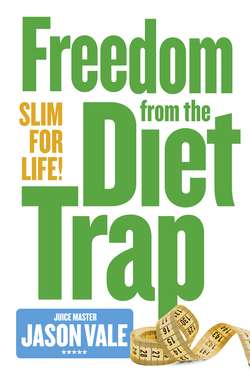Читать книгу Freedom from the Diet Trap: Slim for Life - Jason Vale, Jason Vale - Страница 31
CHANGING YOUR EATING HABITS
ОглавлениеJust as important as your diet is the way you eat. In order to get and stay ‘Slim for Life’ and to increase your chance of a longer life, it is vital to learn the process of eating just to the point of being almost full. It has been shown many times over that the lighter the burden put on the digestive system, the longer – on average – a person lives. This principle is key to lifelong slimness.
It takes about twenty to thirty minutes for the body to acknowledge it has all of its nutritional requirements, so if you eat until you are full you have overeaten. This is also why it is so important to chew your food thoroughly, as it gives the body a chance to acknowledge it is going to be fed. The enzymes in your mouth are more powerful than those in your stomach, and it is essential to use your ‘natural blender’ (your mouth) before swallowing to signal the right digestive juices in your stomach. It seems odd that people say they love their food so much, and that is why they find it hard to change, yet it’s the very thing they miss out on every time. Think about it. Most people are on the next forkful as they gulp down the previous unchewed mouthful. They are completely missing their food already!
A study carried out by the University of Osaka, Japan, and published on the website of the British Medical Journal, illustrated that people who eat quickly and eat until they are full are three times as likely to be overweight than those who eat slowly and leave the table without feeling completely full. The study, led by Professor Hiroyasu Iso, suggests that the manner of eating too quickly – and until absolutely full – is a significant factor in the obesity epidemic, as it overrides signals in the brain which would normally tell the person to stop eating. Dr David Haslam, GP and clinical director for the National Obesity Forum, said, ‘The great dietary gurus of a century ago stressed the importance of chewing food for a long time and eating slowly, and these messages are even more important today.’
